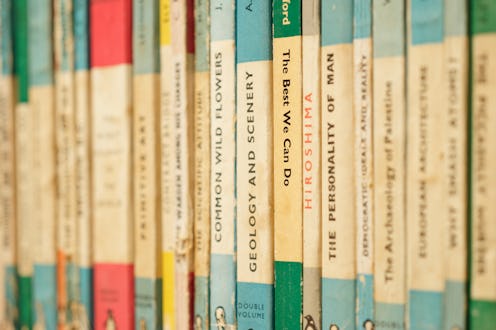Books
Let's All Stop "Book-Shaming" Each Other, Yeah?
A few weeks ago, I noticed that some of my Facebook friends had participated in one of those reading roundup-style online quizzes. You know, similar to the Rory Gilmore book challenge. Instead of the typical good-natured geeky competition (I’ve read more books than you!), though, this one was designed fora less feel-good purpose. “Books You’ll Never Brag About Having Read” asks you to identify all of the books you should apparently be ashamed of having on your bookshelf, including all of the Twilight series, several Dan Brown novels and the biographies of a couple of politicians, among others.
Though my friends who had posted the quiz obviously meant it to be fun, it didn’t sit right with me. My time studying literature in grad school had left me with conflicting feelings over what qualified as a “good” book, and my years taking the subway made me self-conscious of what I chose to read in public. Picking out a book for my daily commute was suddenly becoming stressful. Why did it feel like I was being judged for the book I was reading?
Or, to use a popular internet buzzword: why are we book-shaming?
I recently wrote about my reluctance to read certain genres (specifically female-centric fantasy) in public, and was surprised that it was greeted with a resounding, “Me too!” from many of my friends. For once, I wasn’t being needlessly neurotic. One friend told me that she had a similar fear of being judged for what she was reading on public transportation, while another confessed he had actually disguised the cover when he read 50 Shades of Grey. Obviously, a lot of us are feeling insecure about what we’re reading. So what’s the issue?
It’s tempting to say that the problem is a gendered one, and to a certain extent, it is. After all, that quiz included a lot of romance novels, which tend to be written by women for a female audience. “Chicklit” is another much-maligned genre that’s mocked because of an obvious gender bias. However, there were plenty of male authors on that list as well (I’ll fight anyone who doesn’t appreciate Dan Brown), and I’ve read Jane Austen and Chimamanda Ngozi Adichie in public without feeling like anyone was looking down on me.
Maybe the issue is bookworm snobbery. I had an undergraduate professor who constantly turned his nose up at genre fiction, and though my graduate professors weren’t nearly as rude, it’s still hard to shake the “cannon or bust” mentality three years later. Although the large, rational part of my brain knows that my fellow subway riders couldn’t care less whether I was reading Bridget Jones’s Diary or Crime and Punishment, I know that deep down I’m fighting my own internal prejudice. I may rail against anyone who thinks I’m a less “serious reader” because I like female-written fantasy, but am I not peeking at everyone else’s book covers and judging them too?
Whether the issue is straight snobbery, imposter syndrome, or a combination of the two, we readers need to be nicer to each other and to ourselves. Just because one person chooses to read Infinite Jest and another would rather read YA fiction doesn’t mean one is more of a “reader” than the other. I have two English degrees and I’ll read Sarah J. Maas over David Foster Wallace any day of the week.
Likewise, we need to stop feeling guilty for reading books that others may not consider to be the most “literary”. No more calling a book you like a “guilty pleasure” because you think liking it may be embarrassing. If you like it, own up to it, and don’t let anyone tell you it’s not good enough. Guess what? I really like Eat, Pray, Love, and I read it whenever I’m sad. I don’t care how hard you’re judging me right now. From now on, I’ll read what I want and won’t justify my choices to anyone.
Now excuse me, I’m going to go reread The da Vinci Code for the tenth time.
